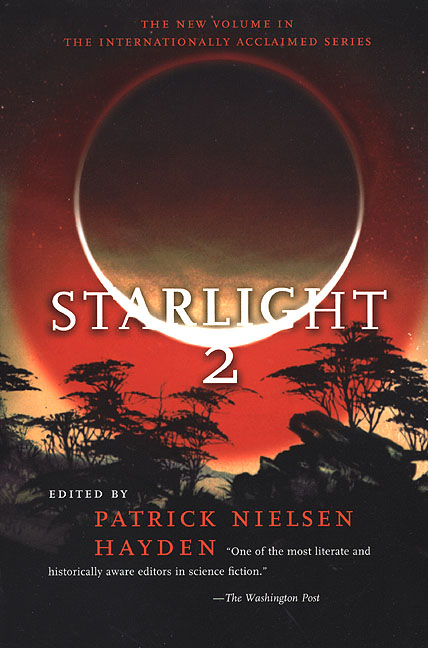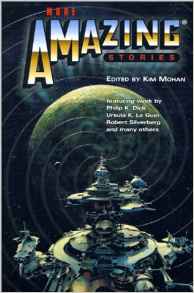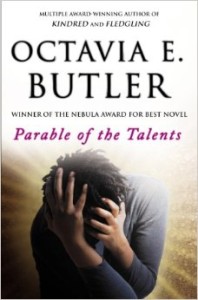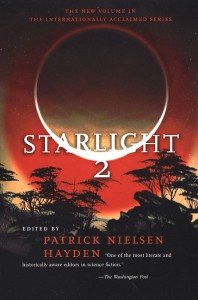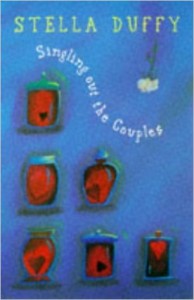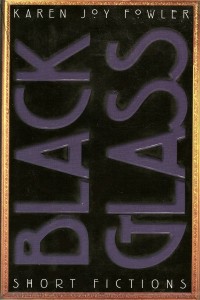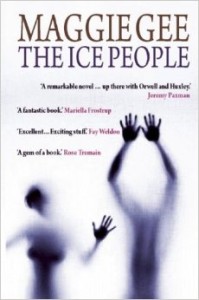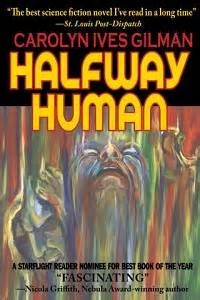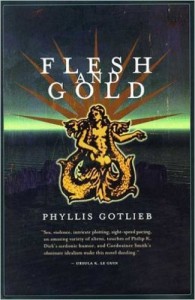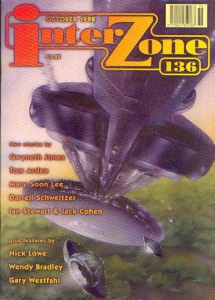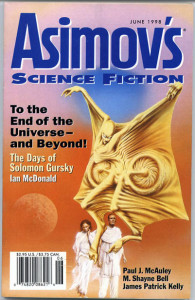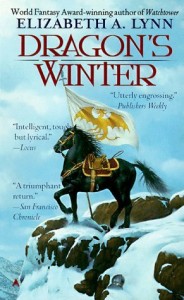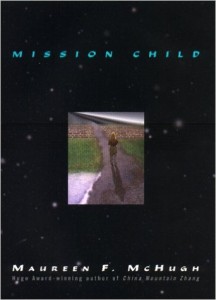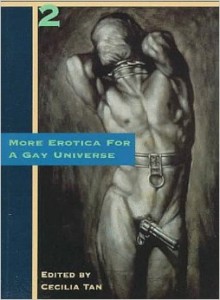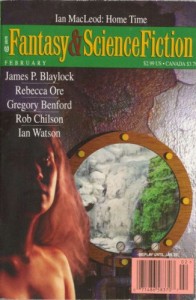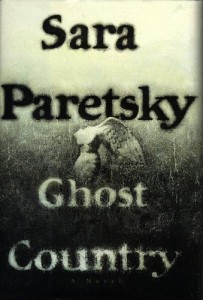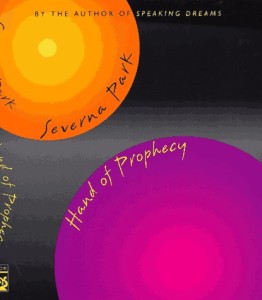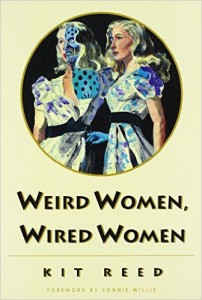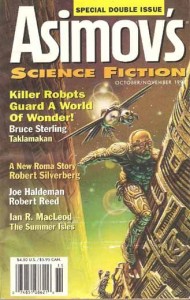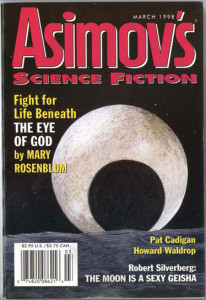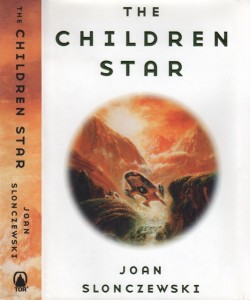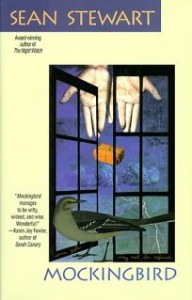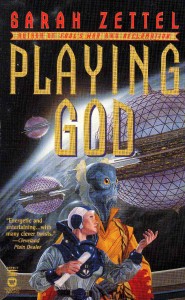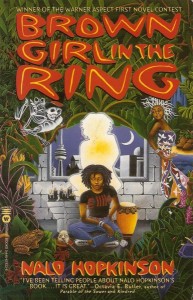The Otherwise Award is pleased to announce that the award ceremony for the 1998 Otherwise Award winner(s) has been held, and the winners have received their award and accolades.
Award Information
Conference Information
- Award Year: 1998
- Award Year Number: Year 8
- Conference: ICFA International Conference on the Fantastic in the Arts 20
- Date: 21-03-1999
- Location: Fort Lauderdale, FL
Award Winner
The 1998 jury chose 1 work for the Otherwise Award.
(Note: Carter later transitioned and changed her name to Cameron Reed.) Funny, well-researched, as focused on gender as anything could be, and very likely even the truth. Hard sf at its best. — Ray Davis Excellent. Really does twist and exercise the mind and emotions – oddly for such a form, emotions are fully engaged – and the reader emerges with a new way of seeing gender. — Candas Jane Dorsey This story does the science/social sciences discourse Real Well – walks the walk and talks the talk down to the referencing. There is NO doubt it is more definitely about gender as opposed to biological sex than anything else so far. There is no doubt I love that last line. It’s the detonator that blows the entire very prettily constructed deconstruction of “gender constructs” clear into the air. “He’s a twelve. I know he’s a twelve. How do I know he’s a man?” At the same time, the story has a couple of problems, and one of them is right in there. If “he” is NOT a man, how come you can, with such confidence, say “he?” Gender is what gives you the undisputed pronoun, “he” or “she” – so if “he” is a twelve – how come there’s doubt that he’s a man? Again, the twins’ differentiation of types within the overall gender binary – “woman not yet to menopause”, “man with atrophied sex organs” – are all based on biological variations – subtle, fascinating, eye-opening so long as you regard gender as biologically based, and certainly does things with the idea of the bare binary pair – and this schema does allow for hermaphrodites, yes. But what does it do with performed gender identities? How would the twins categorize a drag queen or a butch lesbian in full regalia? It seems to me that although this story comes closest to overt deconstruction, even it has not completely mastered the intersection in “gender” between culture, performance, and biology. That said, this is the closest to an overt and outright exploration of gender that I’ve seen so far, and for that it deserves the winner’s vote. — Sylvia Kelso On the political journey to understand gender, I had reached the point of thinking that gender is all external to the person; but external and manifested by the person whose gender it is. I read this story as saying that it’s external and manifested by the person who is reading the gender, and what’s more, either there are actually no genders, or there are many, many genders. The idea that there are as many as two, or only two, is completely dismissible. By the end of the story, the idea that gender can be known by the person reading the gender has grown questionable, and along with it the means of knowing gender. Gender perception or lack of it is not related to sexual desire in “Congenital Agenesis”, which makes me like the story all the better. A complaint I’ve often had this year is that fiction ostensibly about gender turns out to be about freedom/slavery, or children, or race. The idea of The Other is so slippery, and so useful, allowing any Other to stand in for any other Other. In “Congenital Agenesis” Carter looks gender straight in the face, and gender is the thing that blinks. — Kate SchaeferCongenital Agenesis of Gender Ideation by Raphael Carter (now Cameron Reed) (Tor Books, 1998)
Work Information
Title: Congenital Agenesis of Gender IdeationAuthor: Raphael Carter (now Cameron Reed)Collection:
Title: Starlight 2Editor: Patrick Nielsen HaydenPublisher:
Publisher Name: Tor BooksCountry: USYear: 1998
Award Honor List
See full details about the 1998 Honor List
The 1998 jury chose 26 works for the Honor List This Goddess-as-horny-trickster story was genuinely funny, and, instead of seeming simply referential, the slightly distorted echoes of familiar myths and fairy tales simulate the holographic quality (“all stories can be deduced from this story”) that many humorous folk tales have. Arnason’s “lying myth” frame story builds in forgiveness for any tone-wavering between anthropologist-reported folk tale and art fairy tale, and makes explicit the tension between the supposed center of the story (the gauze banner) and the storywriter’s emphasis on hermaphroditism and moral relativism. — Ray Davis A strong story. I am not sure that it had something NEW to say about gender, or just did more ringing the changes…but I liked very much the Goddess who was whatever s/he pleased. I liked the mythology, it had the right ring to it. Arnason is a wonderful writer with a rigorous expectation that the reader will journey far, even during a short piece like this. This particular journey was both improving and a lot of fun. — Candas Jane Dorsey A middle-of-a-trilogy which I suspect I like all the more for its pruned ambitions. Three pivotal years in the early career of the young African-American female founder of a new religion are presented, including persecution, betrayal, and loss of family, with little in the way of sf gee-whizzery or supernatural imagery; even the religion’s bible is bare-bones and abstract. As with McHugh’s Mission Child, the restraint pays off in credibility and emotional power, even though the on-again off-again (but mostly off) use of genre possibilities can be frustrating. Gender exploration angle: the conflict between the role (and rewards) of a prophet and the roles (and rewards) of wife and mother. — Ray Davis A powerful book, immensely passionate and well-realised, but like other brilliant works that we read, in the end gender issues took second place to other discussions. Other awards, yes; the Tiptree, unfortunately not. The portrait of the miscommunication between family members is enough to break your heart, even without the external oppression by the fundamentalist thugs. — Candas Jane Dorsey A great science fiction story about free will — but free will is what it explores, not gender. Instead, traditional gender assumptions are taken for granted to make the author’s job easier: The protagonist must not take action. That’s easier for the reader to accept if she’s female. But there must be no doubt that the protagonist wants to take action. Thus, the legendarily powerful love of mother for child is brought into play. The story deserves an award, but not the Tiptree. — Ray Davis This is the best SF story I have read this year. On the one side, brilliant handling of speech analysis discourse, grasp of physics, and exploration of ideas of non-linear time and its consequences. On the other, an equally striking ease with what might be called The Mother Tongue – the voice of a mother talking to or of her child was never out of tune, from its most loving to its most exasperated. Add to this some of the most determinedly unorthodox aliens I’ve met in a long time, and a firm grasp of what a “performative” in language really means; add to that, a restrainedly elegiac tone that underlines the final tragedy/irony of the story, the fact that, given its premises, free will is a matter of choice – but not as we understand it in linear concepts of time – and I can’t think of much else I’d want in a piece of SF. Not a Tiptree winner, because it is not concerned to explore the concepts of gender – but the head spins when you wonder what might have happened if it did. — Sylvia Kelso Explores motherhood in an interesting way, though its focus is on the nature of time (or perhaps a nature of time) as expressed through grammar. May be the best single story I’ve read this year; my choice for the novella Hugo, but not the Tiptree. — Kate Schaefer Couple resentment is often felt but seldom so delighted in, and, after some suspenseful flirtations with warmth, Duffy stands loyally by the forces of nastiness. The most harmless fantasy-life stereotypes become real-life monsters, efficiently raising some interesting points about escape and control fantasies in general. The Aphrodite-as-Kali theme is handled here with unusual lack of misogyny, and the book convincingly associates couple-envy and the desire for coupling with other non-gendered emotions, rather than tying it to gender-based character cliches. — Ray Davis Excellently wicked, very nihilistic — I was depressed all evening after I read it — but I liked its relentless social critique. Nobody got to be the good guy. Do you ever wonder how a writer can live inside a distasteful book long enough to write it? I don’t mean a BAD book, but one like this that is brilliantly distasteful – or like Delany’s Triton. I wondered, after I read the ending, how hard it would be to live in Duffy’s head…or for Duffy to live in the head of this book from start to finish. (Which came first, the chicken or the egg?) I think the Bouncing Baby Both was one of the spots where it perhaps broke new ground on gender, but in the end, the gender issues took second place to other effects. — Candas Jane Dorsey It’s bitter, witty, cruel, and thorough in exploring certain fantasy aspects of gender. — Kate Schaefer Wonderfully written, stinging, zingy modern fairy tale combining recognizably real life in contemporary London with a dark, archetypal fantasy world. The main character is a heartless princess who sets out to break up three happy couples, wooing away from their beloved in turn a heterosexual man, a gay man, and a married woman. I thought this looked at gender in a different way — not as roles within society, not as an attempt to redefine those roles or break them down or get rid of them, but rather it considered “Male” and “Female” as markers of incompleteness, needing to be made whole by finding a partner (not necessarily of the “opposite” sex, either, since the gay couple was just as socially rewarded as the married and engaged heterosexuals) and being validated only within a partnership. I also liked the way the princess was represented — she’s not breaking up couples for the usual “female” reasons of a loneliness or revenge on a rival — and I liked the fantasy of the ungendered, perfect “bouncing Baby Both”. — Lisa Tuttle It’s too bad that “The Travails,” which found first publication in BLACK GLASS, is ineligible for the Tiptree. Sardonic, funny, and heart-lacerating enough to give Jonathan Swift a run for his money, this is the best lives-of-wives story I’ve ever read. — Ray Davis Karen Joy Fowler’s book is ineligible but really wonderful – beautifully written, allusive, provocative stories. If it hadn’t been written by a Founding Mother of this award, I would want to give the award to this beautiful book, or split the award with Raphael Carter. — Candas Jane Dorsey A fascinating portrait of a person and a future. The notably nasty and effective evocation of the Good-Overseer man in a broken Europe reminded me of Triton in a peculiar way… I found it chilling (pun intended). Rather than taking him as expressing some opinion of the author, I thought the white middle-class het Ice People narrator was a rhetorical device (like in Triton) and thus meant to be detestable, and it was one of the things I admired the author for. I personally have never been able to stay inside the head of a character that annoying long enough to write a short story let alone a whole book. Gives me the creeps all over and I have to change points of view. The rhetorical effect of such a character is powerful and nasty. — Candas Jane Dorsey The ideas are interesting, but it seemed to me that she was positing a future for the sake of rhetoric, without having compelling enough rhetoric or entertaining enough fiction or high-quality enough prose to make me excuse her for it. — Kate Schaefer I was pleased to see an sf writer working with something like the Greek form of slavery, in which slaves were spoken about as if they had biologically-determined traits even though many of them began life as unenslaved Greeks. I also liked the “you’re in or out” decision based on arbitrary test results, and the very believable way the novel conflates slave labor and child labor. Since both of those overlap to a confusing (and, I think, stabilizing) extent with sexism and sexual exploitation, it also raises interesting thoughts about gendered society. But (as far as I could see, anyway) it didn’t investigate those thoughts so much as report them. — Ray Davis I enjoyed this book, and upon first reading placed it on the honor list without reservation, but I did wonder about the happy ending: it seemed a bit slick, after all that complexity earlier. There were times when the book seemed a bit of a tract, but the story carried me along enough that I didn’t mind. Not so much about gender, however, as about child abuse, slavery and prostitution. — Candas Jane Dorsey The conflicts seemed to me to be about child abuse and slavery rather than about gender — to make the book actually be about gender, I’d need to see more response to the sexless gender from the population of “normal” humans. It read more like a traditional positing of the Other as alien and then using the Other to work out displaced emotions concerning sexual child abuse and enslaving “primitive” races. This is a traditional use of science fiction, a way safely to examine things that are too scary to look at directly, but what it does to the thing looked at directly — in this case, gender — is render it invisible, since it’s being used as a stand-in for something else. With all that, it’s a thoughtful book. Gilman does try to confront what it would be like if there were another gender, an asexual gender, to take away the burden of child-rearing; and what if all familial relations were abolished, and what if there were a Platonic Republic? Her answer is yet another unfair society, as it must be; Plato’s Republic is an unpleasant place, and all journeys toward it are dehumanizing (vide Cambodia). — Kate Schaefer I found this a good, old-fashioned read which reminded me of why I like SF in the first place. I loved the passion and intelligence here brought to bear on a serious subject — that of the creation and perpetuation of an hereditary underclass. In this book, the class is a neuter sex, supposed to be childlike and unintelligent, which is abused and exploited in the name of “protection” and whose existence allows adults to avoid both sexual discrimination and undesirable tasks. Although this is how women have been “made” and treated in the past (and still are — consider forced prostitution, coerced marriage and breeding), for most readers this will probably seem to be more about issues of slavery and the abuse of children than cutting-edge gender issues. — Lisa Tuttle A good book for another award. I loved it for itself, and enjoyed the last pages particularly, but didn’t feel it made as much comment on gender as many on this honor list, so had to agree it had limited eligibility. — Candas Jane Dorsey Another well-written book addressing concerns of slavery, freedom, and sentience rather than gender. — Kate Schaefer Immediately climbed onto my shortlist, just below “Lovestory” and for some of the same reasons of skill, emotion and subtlety. Evoked many questions and explorations of gender/ parenthood/ ownership. A strange and somewhat haunting mixture of genres. Hard to comment without breaking the fragile, intense mood it generates. — Candas Jane Dorsey Lovely, powerful, absolutely brilliant story set in the near future. In part a reworking of “Cinderella” (that’s the title), in part a warning about possible spiritual consequences of being able to reform the world (and the people in it) closer to the heart’s desire, at first glance it might not seem to be about gender. There are no men in the story; all the important characters are women, and even little Cinders’ chief object of desire, her “prince”, is her mother; the narrator is partner in a lesbian marriage (presented matter-of-factly), and no one’s sexuality or gender is presented as an “issue.” The focus of the story is parenting and reproduction, and on the fantasies children have about their parents, and which adults have about their children (real and potential). I say “Parenting” rather than “mothering” because despite all the characters being women, the issues apply to both men and women. In the world of the story the creation of children has been divorced from nature and chance alike and become (for the wealthy) a matter of completely personal free choice, thanks to cloning, gene-splicing and other techniques enabling them to create “perfect” children whether as lifestyle accessories or out of love for their partners or whatever. Reproduction and the consequent need for mothers and fathers clearly demarked has been the most consistent reason for forcing people into one of only two genders. Removing the link between sex and reproduction will inevitably change perceptions of gender — and this story begins to explore that area, way out on the frontier in Tiptree territory. — Lisa Tuttle Le Guin’s “Unchosen Love” is like a folktale; this is like a Douglas Sirk movie. Splitting Mother’s role from Wife’s role is a natural way to run a three-sex story, and the story is sharply constructed to bring out the edges of the ensuing family structure in the shortest possible space. A wonderfully moving piece: my favorite work by Kelly. — Ray Davis I wrote “a contenda!” when I read it. It was the first thing I read that went Beyond in a way I found significant and moving. I wrote: “Yes! Brilliant moment of change and its effects!” I read it as a tragedy demonstrating – without preaching – that people are prevented by rigid gender roles from 1) pursuit of individual goals and self-expression 2) even being able to communicate about differences from rigid role norms 3) being able to avoid hurting others in relationship when rigid roles collide with individual desires 4) respecting others. The Mam is respected more by the mother who leaves than by the father who “protects” her from discussions and then is unable to see her response for what it is. I was moved very strongly by the depth of the mis-communication and pain between them as a result of rigid social norms. I had the same hit off it as I got from Henry Kreisel’s “The Broken Globe”, a classic story about the conflict between the flat-earth view of an old-world religious fundamentalist and his young son being educated in scientific things (son eventually becomes cosmologist). In that story, the end, when the old man gestures to the prairie horizon and says “See? She is flat, and she does not move!” is one of my favourite moments in literature. The heart of the story is not the triad combo (indeed, everything we’ve seen has been done before, in a way) nor the individual roles, but the tragedy that comes of applying those roles like cookie-cutters to people’s lives. The fact that the story never gets didactic, stays right in the realm of feeling, makes it all the more powerful. You can see that all these likeable people are trapped, and are teaching their children to trap themselves in turn — and there are, as always, sanctions for those who dare step out. It is not that she was the mother that was the problem — the story could have been told from the mother’s POV with the father going, though that would have had a different loading of reader preconceptions — it is that anyone went, and learned that there was a different way — and even more, dared then to come back and say so. In discussion with other judges, who might have seen the mother as the butt of the societal disapproval, I realised that I thought that all the characters in “Lovestory” were in a predicament. It wasn’t just uppity mother, obdurate nanny, well-meaning father with ideological loading for our time. I thought the ideological loading was “everybody who subscribes to gender roles suffers one way or another”. As for the “Kit Reed housewife” Mam, that was one of the things I found very neat — that content was there without rubbing it in. It gave me the creeps without ever the author having to say “look how awful this is”, like Reed does, and so I thought Kelly did a better job of warning about the dangers of these rigid social practices than Reed did (which is saying quite a bit!) Look at the way the father condescends to the Mam because the Mam is only a Mam, can’t think, etc., and how surprising to the father when the Mam has a rebellion, and how little he understands anything the Mam does or says, and how relieved he is at the end when order is restored. And remember, “all these happy smells made Valun a little ill.” Valun respects the Mam more than Silmien does. What I liked was that they were all blind, misguided, tyrannical (each in their way), understandable (each in their way), stubborn, struggling and so on. All of them were acting from the pressures that their contact with a different system, and the knowledge that comes with it, was putting on their own social system. What systems theory in therapy tells us is that there is often an “identified patient” who acts out the stress, dysfunction or pain of the whole family. The mother acted for them all, and they were all equally responsible and suffered equal consequences. That’s why I liked the story so much, because it didn’t set up the Good Female Rebel Crushed by The System as represented by the Hidebound Father and the Earthmother Nanny. Instead, it just presented a bunch of people in the throes of love, change and pain. That to me is what makes for a powerful piece of art which conveys a complex message, rather than just stands as an artful polemic: “Lovestory” is definitely the former rather than the latter. — Candas Jane Dorsey A wonderful example of how depicting an alien way of being “normal” can make our own “normal” society look weird. The three-way marriage comes across as cosy, inevitable and tragic; when you learn that it is not inevitable, the scariness of the modern human condition, with technology releasing us from all the inevitables which confronted our ancestors, comes sweeping through like a cold wind, lonely, terrifying and exhilarating. With “La Cenerentola” and “Congenital Agenesis of Gender Ideation” , “Lovestory” makes up a triptych that everyone interested in the human condition in what may be a genderless or multigendered future really must read, and among the very best the SF field had to offer in 1998. — Lisa Tuttle Le Guin takes a gothic romantic plot and uses some gender-relation-shifting to replace the more tragic or less believable endings we’d expect with what would seem to be a fairly conventional happy ending in the story’s culture. Fun as a romance, and very believable as an implied defense of the “rightness” of the culture the romance was purportedly written for. — Ray Davis Very moving, and of course with her usual openness and creativity in what is a relationship – and her beautiful writing. But this is one year I don’t think she’s gonna get the chocolate… Another award, by all means, and the sooner the better, but not this one, this year. — Candas Jane Dorsey I enjoyed reading the book but felt that in the years since Lynn was out on the frontier with the phenomenal authorial courage represented by her trilogy and The Sardonyx Net, others have followed her into that territory and built settlements around her, so that now she sits firmly in the centre of a certain kind of intelligent, emotional, beautifully-written fantasy. This book has some of her familiar tropes, and I am immensely glad she is writing again, but I wish the Tiptree had existed at the time of her earlier books, because this one has been crowded down the list by a couple of others. — Candas Jane Dorsey At first, I was disappointed by the familiarity of the characters and set-up, but as McHugh stuck to her initial concept, I gained real affection for the book, and the cross-gender cosmopolitan “citizen of the world” that’s finally delivered seemed an honestly earned reward for the author’s restraint. My only stumbling block was the overkill of the book’s genre. Why was this science fiction instead of a mainstream novel about a refugee from a Third World country? — Ray Davis A beautiful book but there’s an odd condensation at the end which moves gender and family to the side and saving the world in. I fully support saving the world, and I consider this an amazing piece of work with the courage to be harsh and uncompromising, but others made more direct comments on gender, and so in the end I moved it down in the ranking order. I hope it wins some other award though… — Candas Jane Dorsey Mission Child went right onto my honor list, despite or perhaps because of being about work rather than about gender, and I always find work (as opposed to adventure) as the subject of science fiction fascinating. McHugh’s subject is always work, just as Cecelia Holland’s subject is always power. Work: what work men do, what work women do, what clothes they may wear while they do that work, what clothes they must wear while they do that work, and what difference dropping those requirements can make to an individual. Hmm. As I think about it, her subject wasn’t work, at least as she probably saw it: her subject was the disruption experienced by a society at the entrance into it of a technologically different society, but since she portrayed that subject through the medium of a the life of a member of the more primitive society and since life consists of getting food, shelter, and clothing, it was about work. — Kate Schaefer The notion that a run-of-the-mill gay porn hero (buffed, blond, and Bondaged & Disciplined) would so quickly and joyfully turn into a soft blob who loves soft blobs really did hold some shock value for me. It may not be the cleverest, widest-ranging, or most moving fiction that I read this year, but it’s genuinely speculative sex writing which manages to distinguish “man” from “manly” and “woman” from “squishy.” — Ray Davis I must say that the ongoing fondness for “The Hetairai Turncoat” baffles me. I find it an undistinguished piece of gay porn with a strong streak of the misogyny that sometimes accompanies such porn, and with repetition of common themes. I don’t believe it has anything new to say about male gender whether queer or not. I would have strenuously opposed putting it anywhere near the honor list, but some of the elegant readings of it, which I find far more creative than the piece itself, do seem to deserve the light of day. — Candas Jane Dorsey One of the few contenders to deal specifically with masculinity rather than feminine or general gender constructions. A sometimes delicately ironic look at constructions of masculinity through the overlaid conventions of gay erotica and science fiction – first contacts, sex with aliens, transformation by aliens – but not heterosexual sex, and not orthodox transformations. But it was the further intersection between images of hegemonic masculinity – hard, impervious, muscular – with general Western attitudes to weight and obesity, that interrogated and even deconstructed the party lines in straight or gay masculine gender constructions. If this did not open new visions on gender, it offered a striking critique of at least one gender orthodoxy. — Sylvia Kelso Creepy, deliciously nasty, reminded me of Kit Reed. Good work but not Tiptreeable. — Candas Jane Dorsey Why I like “Accelerated Grimace” so much: a great deal of it is Ore’s tone, which is flat and as affectless as it can be while expressing despair. The narrator suffers from the deadly sin of anomie, not one of your more popular deadly sins. This story explores the extreme of traditional gender roles in which the woman gives up everything to support the man emotionally, everything, even in her core, so that the man sees himself as the center of the universe. The woman believes that she sees herself as the center of her universe, as any healthy person should, and is worried by a new technology which will allow her husband-the-artist to see what she really thinks, so he can use it as material for his art. He is not disappointed to discover that she sees herself as his future widow, because as a widow she is defined in relation to him, not in relation to herself; she is devastated to realize that this is true. No, this is not at all a new idea. It’s the same old ugly idea we’ve seen over and over again, baldly displayed and labeled as ugly, with the unpleasant thrill of recognition that says, no matter how ugly this is, no matter how many times it has been exposed and named, it’s still here. It’s still a truth about men and women, and as long as it is a truth, it needs to be said. It is the story which reminds me most of Tiptree — of her own bleak stories, often devoid of hope — of any we’ve read this year. It is an uncomfortable story. I like the way it explores art (the work of making stuff that one has to make, because one has to make it even though it isn’t useful) and Art (the cult of personality around people who have to make stuff and who, for some reason, have found other people who want to look at the stuff). — Kate Schaefer The novel’s Ishtar figure is a portrait of a deity that could have been influenced by Sarah Canary‘s portrait of the alien: allowing for the gap in writerly skill, there’s a similar feeling of inevitable rightness about the unknowability of the character. It’s a conception worthy of (dare I say it?) Emshwiller. Sexuality and the Big Woman Figure (the nourishment/threat/sensuality of mama’s breasts are Starr’s most obsessible/accessible aspect) are at the heart of Paretsky’s goddess F/X, and if only for managing that without ruffling my bristles in any of the usual ways, I’d have to say that Paretsky has expanded my understanding of gender. — Ray Davis A beautifully angry book, the Goddess manifest out of female rage, and worthy of the shortlist for its passion, but doesn’t push the envelope far enough. — Candas Jane Dorsey I was expecting this to be dismissible, and I was astonished to find it the most compelling read of the year except for Singling Out The Couples. Despite thinking that none of the characters were likable and that some of them were cliches, I had to keep turning the pages. Paretsky’s portrayal of Ishtar is as a flawed, silent, healing deity, reflecting the inner natures of the book’s characters back at them, making them more wholly what they already are, sometimes to their benefit, sometimes to their peril. — Kate Schaefer For sheer pleasure, my favorite of the many slave novels we considered. Unlike Mary Doria Russell, Severna Park remembers that the gladiator scenes of Spartacus were more interesting than the speeches. Writers often seem to think that every battle is between the “good” and the “bad”; Hand of Prophecy efficiently pushes the need for the oppressed to operate together while different oppressors fight over them. Hand Of Prophecy is pulpish in some ways, and one of them is the attraction built biologically into the protagonist. But, oh, did I appreciate Park’s pointing out that biology is not necessarily destiny; that just as the Heinlein hero refuses to obey his fear, it’s possible for a human being (even a female!) to refuse to obey powerful romantic cravings without that refusal being construed as some sort of craven defeat. — Ray Davis Notable for its energy and strong statements but in the end it is more about slavery and power than gender, so others crowded it out. — Candas Jane Dorsey The scary aspects of protofeminism can’t be brought out much more directly than in 1974’s “Songs of War,” a “womanist” sf story energetically dedicated to the proposition that things cannot change. Gutsy, funny, nasty, timid, prescient, and insulting, “Songs of War” is a knockout piece with a knockout-drop hangover. Insofar as “exploration” includes notes like “here there be monsters,” it’s a gender-exploring story powerful enough to gather the collection around it, even though the collection is actually weighted towards middle class American mother-daughter conflicts. — Ray Davis I found this book almost unbearable to read, not because it was bad but quite the opposite, rather because it was such a relentless indictment of a certain era of social prejudices that reading one story after another in chronological order was like watching a torture session, hearing scream after scream. If we are to reward works which comment on gender in any fashion, then a work which makes so obvious the horror and waste of the “traditional” (that is to say nineteen-fifties-and-sixties middle-class American) role of women (and children) is a strong contender. I realise it is an interpretation of the guidelines that has not so far been considered, but few other works I’ve seem this year were as disturbing nor as (coldly, I admit) passionate. — Candas Jane Dorsey A significant body of work, including stories from 1958 through 1997, relentlessly focussed on women, mainly on women as mothers and daughters. It’s difficult to read straight through; a good short story packs a wallop, and few of us stand up well to wallop after wallop. — Kate Schaefer One of the few playful stories from a collection more notable for its sustained foregrounding of women’s struggles and suffering under the cultural demands of gender: especially, it feels, in the ’40s and ’50s. “Bigfoot” begins with an interesting but not unusual reverse on the “woman-kidnapped-by-alien” theme, a longtime source of nightmare to such women’s owners, and hence, like the you’ll-be-raped-outside scenario, used to make them stay where it is “safe.” In this case home turns out unsafe. The second, now fairly common twist, is that the kidnap victim turns out not to be a victim. The final but not so common twist turns the submerged terror behind the cautionary tale back on its instigator. “What if she liked being kidnapped” – which of course implies, Because I wasn’t as good sex as the kidnapper – becomes an ironic and ultimately thoroughly erosive query about the instigator’s own sexuality, and with it established and orthodox gender roles: What if I, the bereft husband, should like being kidnapped too? A glimpse too brief to merit the award itself, but in its momentary vision quite as unsettling. — Sylvia Kelso Interesting but not quite “Lovestory” – a hard shove at it though. — Candas Jane Dorsey Yes, gender is central, and there is one shift of perception, and the irony that goes with it, but I don’t think it is going to beat out some of my favourites, though I found it memorable. — Candas Jane Dorsey Does a beautiful job of “disappearing” gender, and is a strong and moving book, but it does not speak directly to Tiptree concerns and others which do crowded ahead of it on the honor list. — Candas Jane Dorsey Gender really doesn’t seem to be an issue for any of the sentient races in this book, and Slonczewski pulls this off as background. Deep enough background that I didn’t notice it until I realized that she had portrayed two of the most powerful beings in her universe as lesbian lovers, and no one comments on this, not at their introduction, not later, not ever. The word “lesbian” doesn’t appear in the book. This is what I want to see in society, and don’t ever expect to see in any of our lifetimes. I like seeing it in fiction, and I honor Slonczewski for doing it so successfully. Because it’s done in deep background, gender is not explored nor expanded: it’s resolved. The issues in the book are not gender issues, but issues of freedom, slavery, and sentience: extremely interesting issues, but not Tiptree-award concerns. — Kate Schaefer A rare, possibly unique, critical and sympathetic look at The Liberal Heterosexual State of Things in which feminist tenets, “guy stuff,” sex workers, and the emotional needs of romance all supposedly coexist without conflict or confusion. A brilliantly observed story with a long overdue twist on the male-becomes-female surprise ending. — Ray Davis An excellent story qua story, which I liked reading it, and it does the satire of romantic expectations from lovers and from joy-houses very prettily, but the ending just did not carry enough impact. It was House of Sleep over in small so far as I was concerned, and with less interest in the ambiguity, because in Sleep at least the reaction to the change of sex is left open to the imagination. Elegant but not quite there for me. — Sylvia Kelso Another reader-vs.-juror conflict, since I immediately began pressing this book on friends while remaining reluctant to push it for the award. The well-observed down-to-earth humor of the narrator’s problems is a wonderful relief from the usual wild-assed ideas of conflict: her seduction-cum-firing scene alone makes the novel worth reading. The “exotic” elements seem like parts of life rather than easy marks of “coolness” or “authenticity”; for example, how many genre writers would not end up demonizing Carlos and his Muertomobile? And the embedded Little Lost Girl tales were creepy enough to be excerpted into horror anthologies. But the finishing flourish of the last two pages knocked this Tiptree juror out of the book and onto the author photo: this is a nice guy generalizing in a sentimental way about women. — Ray Davis I loved the book. I don’t think it significantly speaks to gender but it is a wonderful piece of work. The protagonist certainly has to deal with some gender roles – but what I like in Sean’s work is the human approach to relationships in general, the idea of the centrality of everyday life as the battleground of all important human events, and his willingness to speak the language of emotion. — Candas Jane Dorsey The pleasures of this novel are in its expositional structure and its big sf ideas. Zettel’s aliens aren’t evil barbarians set on conquest of humanity; they’re more realistically set on elimination of each other. The various intrigues and betrayals among peoples ring much truer (cloudier, more vicious) than the politics of the other sf I’ve read this year. As for gender exploration — let’s try to ignore the human side of the story, since that boiled down to “Men and women can be friends as long as they’re well-educated and usually separated” and “Gender parity is achievable in a childless heterosexual professional setting.” But I loved the alien family structures: that menopause variation, the believability of the unconventional ties Zettel draws between warring, motherhood, and kinship, and the sf-ization of sitcoms’ comic bumbling father figure. — Ray Davis While it was good reading, it didn’t really go anywhere new for me. It wasn’t about human gender but about getting used to aliens who had different genders, and putting them in the forefront narratively at times, which did not seem to be all that new a concept. Some of the micromanagement of the story was pleasing and interesting, but I also had some difficulties with it. — Candas Jane Dorsey Some rather wooden and rather politically correct human characters only highlight the fascination of Zettel’s aliens, a female-centred species whose internecine conflicts and the culture consequent on their inhuman biology were both believable and intriguing. The most interesting questions raised by this book were biological at base, and came from a parallel with humanity, and a recollection of Elaine Morgan’s hypothesis, that menopause was evolved to keep old females’ wisdom as a human resource, rather than have them expend their biological resources in dangerous births. The obvious twist in the Dedelphi story is the gender switch at menopause and the charmingly ironic reversal, both of all those patriarchal SF stories where aliens mutate into deadly female forms, and of all those old quips about brainless women. Because Dedelphi men are the post-menopausal form of Dedelphi women, and they have literally lost their minds. But the less obvious twist is the question that arises in parallel with Morgan’s hypothesis: is the violence that plagues this society due to the absence of “old” women? Could this book function as a parable or investigation of women’s post-menopausal possibilities, a fictional version of Germaine Greer’s The Change? There is no clear indication of such a purpose. Nevertheless, the potential it invokes make a shortlisting no more than its due. — Sylvia Kelso The aliens in this book were among the most fascinating, and fully-realized, I’ve encountered for some time, and I loved the very different take on gender the alien society offered. — Lisa Tuttle An excellent book and I hope it wins other awards, but it doesn’t say as much about gender as about other areas of human emotion: parenthood, community, power, creating the divine, etc. –Candas Jane DorseyThe Gauze Banner, Hwarhath, Eleanor Arnason (Tor Books, 1998)
Parable of the Talents, , Octavia Butler (Seven Stories Press, 1998)
Story of Your Life, Ted Chiang (Tor Books, 1998)
Singling Out The Couples, Stella Duffy (Sceptre, U.K., 1998)
Black Glass, Karen Joy Fowler (Henry Holt & Company, 1998)
The Ice People, Maggie Gee (Richard Cohen Books, U.S., 1998)
Halfway Human, Carolyn Ives Gilman (Avon/Eos, U.S., 1998)
Flesh and Gold, Phyllis Gotlieb (Tor Books, U.S., 1998)
La Cenerentola, Gwyneth Jones
Lovestory, James Patrick Kelly
Unchosen Love, , Ursula K. Le Guin (TSR, 1998)
Dragon's Winter, , Elizabeth A. Lynn (Ace/Berkley, 1998)
Mission Child, Maureen F. McHugh (Avon Eos, U.S., 1998)
The Hetairai Turncoat, Karl-Rene Moore (Circlet Press, U.S., 1997)
Accelerated Grimace, Rebecca Ore
Ghost Country, Sara Paretsky (Delacorte Press, U.S., 1998)
Hand of Prophecy, , Severna Park (Avon Eos, U.S., 1998)
Weird Women, Wired Women, Kit Reed (ed.) (Wesleyan University Press, 1998)
Bride of Bigfoot, Kit Reed (Wesleyan University Press, U.S., 1998)
Whiptail, Robert Reed
The Eye of God, Mary Rosenblum
The Children Star, , Joan Slonczewski (Tor Books, 1998)
The House of Expectations, Martha Soukup (Tor Books, U.S., 1998)
Mockingbird, Sean Stewart (Ace, U.S., 1998)
Playing God, Sarah Zettel (Warner Aspect, 1998)
Brown Girl in the Ring, Nalo Hopkinson (Aspect/Warner Books, U.S., 1998)
Award Long List
See full details about the 1998 Long List
The 1998 jury chose 20 works for the Long List
- Datableed, Pat Cadigan
Good story, but didn’t go far enough. A promising premise underutilised. — Candas Jane Dorsey
- House of Sleep, Jonathan Coe (Viking, U.K., 1997)
A fun novel of variations on sleep, positioned in a pleasant overlap of melodrama, cleverness, satire, and farce. As for gender exploration, I don’t see it. The book is much more interested in exploring dreams, film, obsession, memory, and the spotty history of the mental health profession. Loved that eyelid fetish! — Ray Davis
A nastily well-written book, and with some excellent commentary on the difference between how our sexuality perceives gender and how we think it does – but did not take us anywhere we hadn’t been. Greg-Hollingshead-meets-Crying-Game. — Candas Jane Dorsey
- Quintessence: Realizing The Archaic Future, Mary Daly (Beacon Press, 1998)
“It’s different,” as my mother often says when hard-pressed. Daly’s style’s gotten even loopier, the book’s “future” may be the least clearly visualized utopia I’ve encountered since Sunday school’s heaven, and it’s no more (or less) fiction than a Scientology tract. But a vision that insists that kitties, bunnies, and snakes would all frolic peacefully together if only the patriarchy was gone is at least a ridiculousness at drastic variance from all the other ridiculousnesses I’ve had to deal with this year. — Ray Davis
Difficult in ways which did not engender product loyalty. (Completely unreadable and coy to boot.) — Candas Jane Dorsey
- Pig Tales: A Novel Of Lust And Transformation, Marie Darrieussecq (New Press, 1997)
Effective, blackly-funny – but oddly anachronistic. I felt like I had gone back twenty years and was reading one of the texts that inflamed the feminist anger of the late sixties and early seventies. Stating the problem might have been enough then, but much literature which expands the boundaries of gender issues has gone under the bridge since then. — Candas Jane Dorsey
Pig Tales strikes me as a guilty romp. I enjoyed it and occasionally thought it was saying something about the relations of men and women or about the powerful and the powerless, but in the end its beastliness left me without new insights, or even old ones revisited. — Kate Schaefer
-
While many of the stories were effective, I didn’t feel that overall, individually or collectively, they contributed new insight on gender issues. — Candas Jane Dorsey
- Transit, Stephen Dedman
An example of a type of narrative we have seen several times this year, proving that what was radical in 1969, when Genly Ai sledded across the ice with a monosexual in The Left Hand of Darkness, is mainstream in our field now. While I saw with appreciation that “mother” and “father” were function words now (mother who carried the child and thus historically was granted a particular relationship while the sperm donor was the father and had less authority, cf. the last page) and that was consistent, I wondered also what this very traditional teenaged romance structure was going to lead to. Well told, though not my cup of tea as far as romance, but no for the award. — Candas Jane Dorsey
- The Plague Saint, Rita Donovan (Tesseract Books, 1998)
A good book – I should think so, as I published it – but I have to concur with the other judges that it doesn’t push the gender envelope. — Candas Jane Dorsey
Didn’t seem to me to explore gender, but a beautifully-written book about involuntary sainthood and some of the odd uses religion can be put to. — Kate Schaefer
-
There’s one gender twist: penises that are exchanged during sex – but I did not find the society consistent with such a biology. I was curious about why, in a society where bioengineered people could exchange genitals and anyone presumably could bear a child due to the physically-clumsy mechanism of the exchangeable penis, there are still words for “brother” and “sister” and other gender specifics when from time untold they have had this ability; and does Martin turn into Daniel’s sister when he trades off his penis or are they still brothers; and why are there still gender specific names, and… A 1960s coming of age story with a religious challenge instead of a physical one, and with a powerfully Freudian metaphor for sex — but it doesn’t hold together socially or biologically once the well-told tale is analysed. — Candas Jane Dorsey
-
Enjoyable story, notable for the treatment of gender, gender balance, and sexual orientation as resolved issues in an otherwise nearly-standard high fantasy world. — Kate Schaefer
- In the Realm of Dragons, Esther M. Friesner
Another story which does effective work in the new mainstream of gender-conscious speculative fiction. It’s nice that queers get more ink, and it’s a nicely told story, with an excellent intention to help convince readers to oppose bashing — and to remind people that we hate in others what we fear in ourselves — but didn’t cross frontiers of the kind I was looking for for the award. — Candas Jane Dorsey
-
Another example of a type of narrative which considers questions which seem to me to have become mainstream in our field now. I find all these “discovery texts” anachronistic. Stating the problem is no longer enough to win a Tiptree. That said, I must say that I welcome the efforts of a wide spectrum of writers to consider these issues. What seems cutting-edge for me after twenty-seven years of reading the landmark texts in this area is one thing: the young conservative het males who read Jim Gardner and other writers working in this part of the forest will consider this work cutting-edge and apply that Occam’s Razor to their own developing lives. Someone has to take them into this landscape which is new to them if not to us. I think that it is interesting to see what happens in the swirls and eddies behind the icebreakers and the exploration vessels. This is what the midlist, the “mainstream” of F&SF, thinks is out-on-the-edge. — Candas Jane Dorsey
-
Nice time travel story about cut-throat academic physicists; compares and contrasts modern acceptance of lesbians with the closeted world of 1956.
-
A lovely lovely little piece, heartbreaking – but not for this award. — Candas Jane Dorsey
-
I liked reading Dark Water’s Embrace but again I found it was following not leading, same as does Jim Gardner’s book, and I agreed with another judge who said it was biology not gender. I do think it is a lapse of the imagination to assume that the alien humanoid culture would have bi-phobia just like ours, especially if the Ke were not only part of the species but a necessary part of reproduction. It would be like hating your sexuality, and while I realise Augustine managed that, still…there, it would be fundamentalists who defended the trio family, wouldn’t it? I fear that at the last it fails because the author can’t imagine past male-female fences. — Candas Jane Dorsey
-
I liked it, and I thought it was a real winner of its type — but didn’t cross any boundaries in Tiptree terms: we know there must be non-het aboriginals — so? If I were judging a YA book award, it’s be a honor list item or even a winner, (as long as there wasn’t a Jill-Paton-Walsh ringer in the field), but for our purposes, no. — Candas Jane Dorsey
-
It is not gender but issues of parents and children which drive this book, and Russell’s themes seem somehow more conservative in this one than in The Sparrow. — Candas Jane Dorsey
Children of God is concerned, as The Sparrow was, with Tiptree-type issues (the celibate’s role in society, women’s role in society) and explores them, both in the human context and in the context of the alien world, Rakhat. However, the primary concern of the novel is the transformation of a precariously balanced society into a possibly more just but certainly different society once the balance is disturbed by an outside force. It’s an interesting concern, but not the one we’re focused on here. — Kate Schaefer
- The Drag Queen of Elfland, Lawrence Schimel (Ultra Violet Library, U.S., 1997)
Thought “The Drag Queen of Elfland,” despite the realisation that he was Le Belle Dame etc., was not about gender, but was a one-note gender-substitution story with no real surprises that couldn’t have happened to opposite-sex couples. — Candas Jane Dorsey
-
I’m not much for biological determinism, and I’d feared the worst. But the novel’s exaggerations along those lines were satirical and tidily taken care of by plot twists. And I welcomed the mellowness of the humor and the classically comedic conclusion, though the dialects should’ve been dropped fast and hard. Highly recommended. — Ray Davis
I admire Tepper’s ideology and passion, but for some reason did not find this as winsome as did some other judges. I was sorry not to, for I think that Tepper is doing important work. — Candas Jane Dorsey
-
This book has a female mage in a male college of mages, in some ways a typical genre fantasy set-up, but she’s on another world where the gender roles are wonky (to her) while on her own world, magic is considered sentient and has its own pronoun (lle, ller). Not a winner for this award, but worthy of being on the list of nominees. — Candas Jane Dorsey
-
It’s about a woman working, and a man ignoring or misinterpreting all her signals, spoken and unspoken, leading to his death at her hands. Her work is a particular kind of prostitution; he hires her for a different kind, thinking he can set the terms of the contract at will. I’m a sucker for stories that look like they’re about sex but turn out to be about work. — Kate Schaefer
Jurors
Candas Jane Dorsey
Reflecting on the “meaning” of “expressing gender issues” in the award guidelines has been an interesting challenge. As others, on this jury and in the wide world, have said in many ways, gender seems to be what people are pointing to when they use the term. In general, I think it is a social construct, but I still have a lot to learn about why, then, some people so strongly feel they have an innate gender instead of simply a set of equipment issued without palimpsests of gender pre-written on them. Because I seem to have such personal trouble foregrounding gender as an interpersonal datum, I like to think I can transcend gender, but at the same time I am the product of a very specific and powerful social process that has shaped me, not just in intellectual ways, but in mandating such intimate matters as what clothes I find sexy on what kinds of bodies. Still, it has always been such a struggle for me to learn the “rules” of gender discourse, from the status-quo rules about the presence or absence of men and women in social, sexual and intellectual discourse to the nouvelle proprieties of the hardcore theorists in the revolution against mono/hetero/sexism. The best I can manage as I go about my life is to confront my contradictions willingly, and be honest. In the jury process — schooling myself to read for content that I often do not foreground, a change in reading habits that was remarked upon by more than one jury member — I read for honesty, both intellectual and emotional, and for a willingness to step beyond the boundaries of what we think we know to a new and revolutionary image or landscape.
The most powerful statement that I made during the judging process was when I articulated that it’s not enough to posit alien biology nor to imagine a different culture based on that biology –nor, I’d add, is it enough to tell a dystopian tale about how bad things are, nor use a cute premise to add interesting background, nor to posit future gender wars, biological mutations, genetic tampering, utopias – if that’s as far as the story or novel goes. The first condition of a Tiptreeable text for me is to show beings at the edge of change, transformation, challenge — on the boundary of questions. The second condition, equally as important, is that their story be told with surpassing excellence.
As I was reading, I also assumed that whether or not gender was the main theme of a book, if it made a significant step in how it handled gender or if it did something gender-bending in narrative or character, I considered it eligible. But I came to realise also that alternative orientations are very much in the public awareness now (if I were cynical, I’d say “Trendy!” but we read many good and even some brilliant stories which deserve better than a flippant dismissal) – and that makes, and none too soon I think, the presence of diverse characters and relationships part of the normal range of possibilities when constructing fiction in the present day. Therefore I came to believe that they are — and should be, I think — background, not foreground, and therefore the presence of a gender-bending element was not the only thing which would move a story into eligibility for the final list.
(It also struck me as I read so many stories from Asimov’s that Tiptree juries could give commendations to venues which consistently published Tiptreeable work (or, more formally, “work which includes sex, gender, orientation, and social structures of family and relationship as important subjects of speculation”). and that certainly, on the evidence, Asimov’s would deserve such a commendation.)
As I developed my reading criteria, I realised that each year, as more and more works are eligible, we see a growth in the way that gender is considered one of the core issues a speculative writer must consider: whether that be to take issues of sex and gender into consideration in creating a culture, foreground social processes around sex and gender or simply include as part of the texture and fabric of a story about something else altogether. It strikes me that as gender itself begins to disappear or to be transparent, this award could gradually phase out – and that this is a consummation devoutly to be wished. The Tiptree Award is about the cutting edge of treatment of gender issues. If there were no issues because gender had ceased to be such a consuming preoccupation among people, then the Tiptree Award would vanish too. These musings make an obvious connexion with the story I place at the top of my honor list, “Congenital Agenesis of Gender Ideation”, by Raphael Carter (in Starlight 2).
Among many lyrically written and powerful stories and books considered this year, this was one of the few that moved me into new territory. For a moment, I could glimpse the end of gender – and glimpse at the same moment the impossibility of living in that country (“…then I awoke and found me here on the cold hillside…”)
Kate Schaefer
In our comments on individual works jurors often remark that a work is about something other than gender. As I’ve re-read these comments, it strikes me that the tone may comes across as a complaint that writers are not addressing gender directly. We do have this complaint, but it’s a complaint peculiar to being a juror for this particular prize, rather than a substantive complaint which will carry over into our general reading. Many writers address gender indirectly, use it as a metaphor for some other concern, or treat it as something resolved; as a reader, I am interested in how well they use it for whatever purpose their art requires. As a juror, I am instructed to look for gender expansion or exploration, and when those don’t occur in a piece of fiction about which I’m really excited, I’m disappointed. Another good work I can’t suggest as a prize-winner, I think, and turn to the next work on the pile. I look forward to returning to my normal reading mode, in which my concern with my own enjoyment will be greater than my concern with the fiction’s focus.
There is certainly still plenty of science fiction and fantasy which ignores gender concerns altogether. Because of the nature of the Tiptree award, very little fiction of this sort was sent to the jurors. There is also plenty of science fiction and fantasy which does not ignore gender concerns, but incorporates them as extremely minor elements as a matter of course while concentrating on other stuff. Two stories of this sort I’d like to mention were Michael Swanwick’s “The Very Pulse of the Machine”, a great piece of first-contact science fiction with no gender exploration and no leftover 50’s assumptions, and Bruce Sterling’s “Taklamakan”, a story in which a person of neuter gender is a major character. Sterling only explores the implications of a neuter person for about two sentences, long enough to establish that the idea is there, and then goes on to the rest of the story.
Candas mentions the number of stories we considered which were published in Asimov’s; I’d also like to point out that we received more novels from Avon than from any other publisher, and that all of the novels we received from Avon were pertinent to the award’s concerns. We greatly appreciate the generosity of all the publishers, without which we’d be hard-pressed to get through all this reading. I also appreciate the resources of my local public library, which buys a lot more new and obscure fiction than I had ever suspected.
This whole process has lead me to conclude that I don’t know what the hell gender is; the more I look at it, the more it doesn’t seem to be there. It has something to do with sex, something to do with genitals and what people do with them and with whom they do those things, something to do with reproduction, and something to do with what people do to earn a living and how they dress while they do it, and something to do with how people look at themselves and how others look at them, but it’s something else, too. Damned if I know what it is, but I do know when a story is about it.
- Kate Schaefer (chair)
- Ray Davis
- Candas Jane Dorsey
- Sylvia Kelso
- Lisa Tuttle
Award Ceremony
See full details about the 1998 Ceremony
The 1998 Otherwise Award was given to Raphael Carter at ICFA International Conference on the Fantastic in the Arts 20, March 21, 1999, in Fort Lauderdale, Florida.

